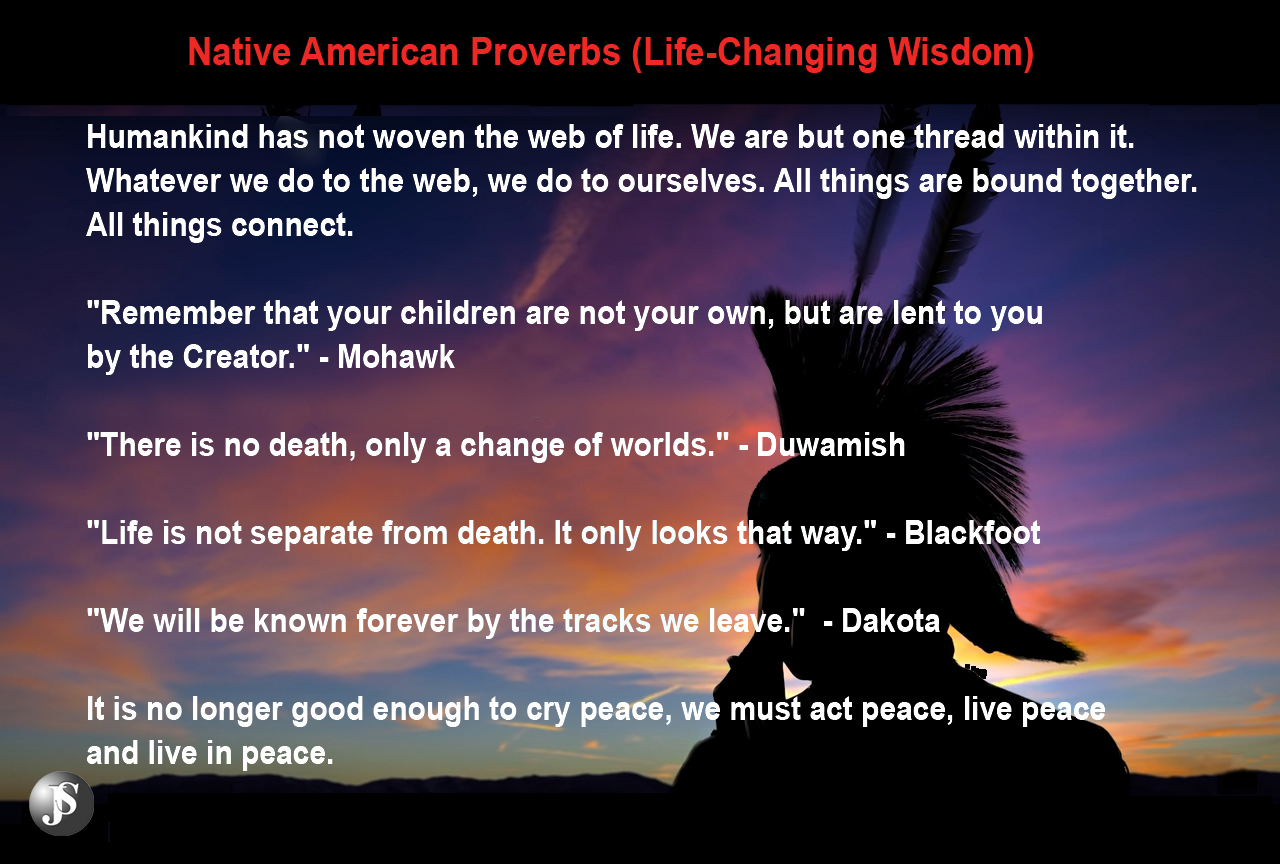The intertwining of Bahá’í teachings and Native American proverbs illustrates a profound resonance that transcends cultural barriers. Both traditions emphasize communal harmony, the interdependence of humanity, and a steadfast pursuit of spiritual and moral elevation. This article delves into the thematic parallels between these teachings, reflecting on how Native American wisdom can elucidate Bahá’í principles—specifically, the idea of finding strength and unity in diversity.
At the core of Bahá’í belief lies the concept of unity in diversity. This tenet posits that the myriad differences among people—be they cultural, racial, or spiritual—are not merely tolerable but rather essential to the unification of humanity. Indeed, Bahá’í teachings remind adherents that true strength is found not in homogeneity but through the synergistic effects of diverse collaborate efforts. It is a celebration of varied perspectives that together shape a richer tapestry of life.
Consider the Native American proverb, “We do not inherit the earth from our ancestors; we borrow it from our children.” This profound reflection invites a reconsideration of our responsibilities towards both past and future generations. Such sentiment evokes a deep-rooted awareness of stewardship, which is echoed in Bahá’í teachings emphasizing the collective responsibility of humanity in safeguarding the planet. The proverb underscores the necessity of unity; it compels individuals toward a cooperative endeavor to cultivate a sustainable environment, reflecting a holistic understanding of existence that is critical in Bahá’í thought.
Another notable saying is, “The earth is but one country, and mankind its citizens.” This proverb resonates with the Bahá’í conviction that humanity is one single entity. It emphasizes the artificial nature of national boundaries, urging followers to contemplate their place in an interconnected world. This view fosters an altruistic disposition, encouraging adherents to engage with global issues as they recognize that the well-being of one is intimately tied to the well-being of all. Such a perspective engenders empathy, fostering relationships that transcend mere coexistence, ultimately promoting societal harmony.
Furthermore, the proverb, “When the last tree dies, the last man dies,” highlights the interconnectedness of all beings on this planet and mirrors the Bahá’í commitment to environmental stewardship. This proverb serves as a stark reminder of the consequences of ecological neglect, hinting at a deeper spiritual truth: every action reverberates through the fabric of creation. Bahá’ís are called to recognize that the preservation of nature is not only a duty but a manifestation of unity; as they cultivate compassion towards the environment, they simultaneously fortify their intrinsic bond with all of creation.
To elucidate further, consider the interrelatedness intrinsic to Native American culture. The Elders often express that “Life is a gift; therefore, live it to the fullest.” This philosophy encapsulates the essence of gratitude and mindfulness. Bahá’í teachings similarly underscore the importance of appreciating life’s transient nature and utilizing one’s gifts to serve others. The universality of this message—forging strength through gratitude—cultivates compassion and altruism, prompting individuals to engage in service that fosters unity.
In the intricate tapestry of both traditions, we find wisdom surrounding the cyclical nature of life. “What is life? It is an echo of nature,” intimates a deep understanding of existence inherent in many indigenous teachings. This perception aligns with the Bahá’í focus on creation as a reflection of divine attributes. Both reveal that life should be lived in harmony with natural laws, emphasizing an interdependent relationship with the environment and with one another. By recognizing the cyclical pursuit of knowledge and growth, Bahá’í followers and indigenous peoples alike can draw upon these principles to cultivate an existence marked by continuous renewal and regeneration.
As one contemplates the myriad teachings that encapsulate both Bahá’í principles and Native American wisdom, the call for communal support and strength becomes crystal clear. The proverb, “We are all related,” emphasizes a shared existence that transcends individualism and encourages collective well-being. In Bahá’í thought, this shared responsibility is akin to the divine directive to promote harmony and justice within humanity. It underscores the fact that, in nurturing each other, communities can harness shared strengths to overcome challenges, thus epitomizing true unity.
Moreover, the proverb, “The wound is the place where the Light enters you,” acknowledges the transformative power of suffering and challenge. In both Bahá’í teachings and Native traditions, adversity is reframed as an opportunity for spiritual and communal growth. The shared belief that trials can lead to enlightenment reinforces the notion that strength often arises from unity forged in the crucible of hardship. This perspective encourages resilience and solidarity, reminding individuals that they are not alone on their journeys.
In conclusion, the synthesis of Bahá’í teachings and Native American proverbs presents a profound narrative on strength and unity. These teachings ironically highlight the complexities of life while simultaneously offering simplicity in their message—strength lies in mutual support, respect for the environment, and recognition of a shared humanity. By embracing these doctrines, individuals can cultivate a profoundly meaningful existence, one that fosters collaboration and nourishes the spirit of unity. As the world continues to face multifaceted challenges, the wisdom contained in these proverbs becomes increasingly relevant, serving as a guiding beacon for a harmonious, interconnected future.
